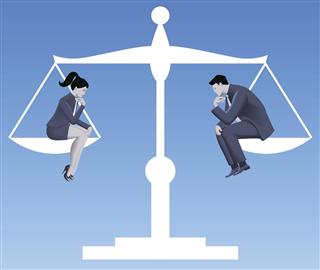
Organizational development (OD), in the simplest of terms, involves ways to develop the organization for the better. The Workspirited write-up below will enlighten you about the characteristics and importance of organizational development.
“Organization development focuses on assuring healthy inter- and intra-unit relationships and helping groups initiate and manage change. Organization development’s primary emphasis is on relationships and processes between and among individuals and groups. Its primary intervention is influence on the relationship of individuals and groups to effect and impact on the organization as a system.” ― McLagan, P, Models of HRD practice, Washington, ASTD Press.
Organizational development is a way to increase the efficiency and effectiveness of an organization. The term was initially coined by Kurt Lewin, formed on the grounds of group dynamics and action research. Widely used by various businesses and entrepreneurial ventures alike, OD is a universally accepted, successful methodology to implement a positive change in the firm. It has certain fixed goals and core values. OD follows an n-staged process, the ‘n’ here being any number depending on the organization. The process, though not benchmarked by anyone in particular, follows different stages, which basically have the same intent, but are differently named. The paragraphs below will elaborate on the characteristics and importance of OD.
Objectives
- To resolve trust as well as support issues within the organization, i.e., to make sure there is an inherent level of trust among the members and that they support each other when needed.
- To encourage employees to avoid procrastination of problems and find effective solutions, pronto.
- To manage the regularly-arising conflicts at the workplace.
- To employ new methods to improve the current operations of the firm.
- To improve the satisfaction level among the employees, i.e., periodic appreciation, fair delegation of responsibility, etc.
- To establish a camaraderie among the employees by helping them co-operate and collaborate better amongst themselves.
- To increase the overall problem-solving capability of the organization for successful results.
Characteristics
Problem-Solving
- It helps find effective solutions to the problems that hamper the steadfast growth of the organization.
- Prolonging this process results in stagnation.
- This characteristic of OD is very important as it is essential to brainstorm techniques to resolve technical as well as other hurdles.
Participation
- It involves active participation of all the organizational members in order to make the OD process successful.
- The members range from the minority staff, to the mid-level managers, to the top shots.
- Everybody needs to cooperate and participate in the developmental process.
Task Accomplishment
- As the firm looks forward to developing internal stability, various procedures are undertaken and tasks are distributed.
- Every member needs to accomplish effectively, whatever task is delegated to him.
- Only then can the targets be achieved for the firm.
Corporate Culture
- OD needs to focus on the workforce as well as the culture of the workplace.
- The success of OD is dependent on a positive corporate culture.
- This can be achieved by enforcing various methods.
Human Values
- A very important characteristic of OD is that it focuses on human as well as social values.
- This involves treating everyone with fairness, eliminating favoritism and biased behavior, focusing on everyone’s needs, believing in a positive outcome and encouraging the others towards the same as well, etc.
Collaboration
- As the word implies, this involves collaboration among the staff.
- It includes methods to help the members collaborate with each other without conflicts.
- This is an essential feature that eliminates differences of opinion and helps everyone see the brighter future.
Change Management
- A total system change is a requisite of OD.
- Without change, the process will not function.
- The change must be positive and this is an inevitable step towards the firm’s success.
Taking Action
- Taking proper action at the proper time is what is important.
- Once the diagnosis is done, effective techniques must be formulated to deal with the existing problems.
- Newer procedures must also be clarified – taking action is vital to OD.
Cooperation
- Similar to collaboration, cooperation helps members compromise and adjust to different situations.
- It helps them understand what to prioritize.
- It also helps them understand each other better, leading to progress.
Goals and Development
- All the goals intent on developing the organization must be planned and laid out.
- These goals and their subsequent achievement help develop the organization.
Stages
As mentioned earlier, the stages in the OD process vary according to different organizations, each of them have their own perspective. Hence, a compiled, neutral view is enumerated below. For starters, you need to get acquainted with the process, which involves 3 major stages – an initial testing, action, and evaluating the action.
Inspection
- Diagnosis of the current situation needs to be done at this level.
- You need to find out what the organization lacks, what improvements can be made, how the commitment level can be increased, etc.
- It is a complicated, chaotic stage, with everyone wanting the best for the organization, but unable to execute any action properly.
- You will need to conduct various interviews and investigations, record observations, follow up etc.
- At this stage, everything will be based on a trial-and-error methodology until some of the intent is clear.
Action
- Once the basic problems are diagnosed, it is time to take action.
- This step leads to stability (not stagnation) and a high performance for the organization.
- Routines are formalized, proper steps are undertaken, changes are established, newer policies emerge, a refined structure is formed, changing the course of the organization.
- As fresh goals are defined, detailed plans are outlined and efforts are undertaken to formulate the same.
- Innovation in products brings about a new vigor to work better, gradually leading to a sense of unity and camaraderie amongst the employees.
- Feedback is also undertaken at this stage, while newer methods of technology are implemented along with skill development.
- Some organizations take the help of third parties to resolve major differences.
- Eventually, this leads to a streamlined professional growth.
Revaluation
- Once the company stabilizes the operations and strives towards a high performance, a revaluation of the procedures should be done.
- This is an important phase, which helps monitor the changes implemented.
- The progress must be evaluated since implementing OD, compared with the situation before, and a structured analysis should be made.
- These observations must be recorded and reported for further reference.
- Care should be taken to see that the earlier mistakes are not repeated.
- Evaluators can help decide if further developmental actions need to be taken or any other strategies need to be implemented.
Importance
- OD is very important in order to expand the productivity of the firm.
- It facilitates a change (for the better) in the organization by helping to analyze various problematic situations and finding efficient solutions.
- It is targeted at product innovation and improved overall efficiency, and though this requires a generous investment of time and capital, it is worth it.
- It helps foster a sense of equality, trust, and cooperation amongst the members, reducing internal strife and conflicts, thus aiming at creating a remarkably confident and united staff division.
- It is an important tool that drives corporate growth. This is achieved through the different phases of OD that help increase consumer demand, product quality, operation expansion, efficient use of company resources, etc.
- OD incorporates several new techniques for improvement, some of them which include development of technology, establishment of quality control, implementation of detailed plans, competitive analysis, extensive research of the target market, etc.
The implementation of organizational development periodically, is very vital for the organization. It helps establish trust and cooperation among the members, increases problem-solving abilities, develops sportsmanship, and helps establish a friendly and efficient corporate culture, which is one of the basic premises of OD. And, do not confuse OD with change management, the two terms differ in their own way. It can be stated that OD plays a pivotal role in bringing about the necessary change in the organization.

















